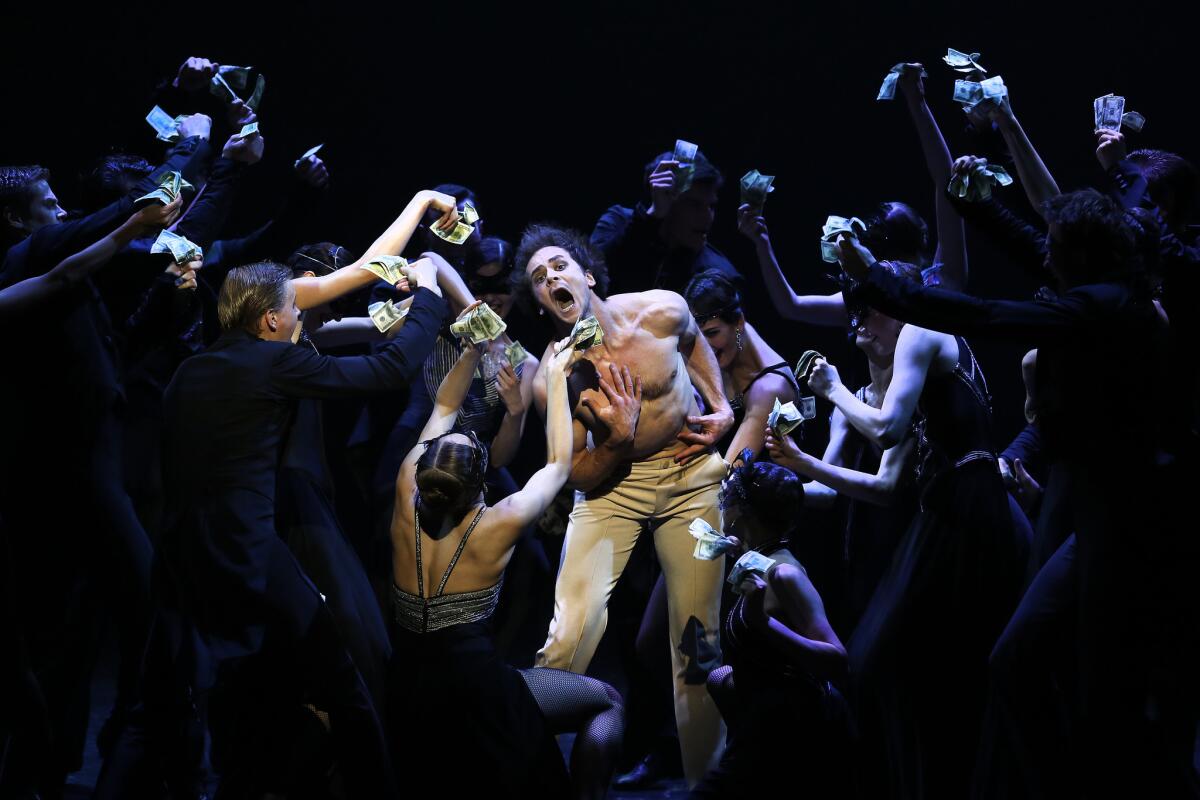With Fitzgerald adaptation ‘Up & Down,’ Eifman succeeds on his own, melodramatic terms

Oleg Gabyshev of the Eifman Ballet of Saint Petersburg performs in “Up and Down” at the Segerstrom Center for the Arts in Costa Mesa on Friday evening.
- Share via
Boris Eifman’s “Up & Down,” which had its West Coast premiere at the Segerstrom Center for the Arts in Costa Mesa on Friday night, is the Russian choreographer’s eighth modern-style ballet to be presented in Southern California in 15 years.
This one covers the same terrain of his other dance-melodramas of emotionally tortured individuals; there’s the same theme of inner and outer lives in conflict. The reward is how gorgeously his 50 or so dancers perform this narrow, semi-classical vocabulary.
Fans get what they expect from the 68-year-old avuncular, black-garbed artist, judging from their standing ovation. So does a critic who tends to dislike the oeuvre. (My one exception is “Red Giselle,” a biography and nightmarish take on the ballet world.)
Rather than repeat myself, I decided on a change in perspective. Clearing cobwebs from my head, I viewed “Up & Down” through Eifman’s own intentions. Does he succeed, at least, on his own terms? That is, does he deliver psychologically steeped dance-theater?
That much he does. Set in the roaring ’20s, “Up & Down” follows a devoted psychiatrist (Oleg Gabyshev), who falls in love with his schizophrenic patient (Lyubov Andreyeva). Her illness is attributed to an incestuous relationship with her father (Jiri Jelínek).
Patient and psychiatrist marry, she forces him to abandon his clinic, and once outside, in the swinging Charleston-hopping, big-bad world, they give into soul-destroying excesses. The psychiatrist goes mad, returning to his asylum as a patient, and the ballet ends.
Eifman began this creation as a two-act adaptation of F. Scott Fitzgerald’s “Tender Is the Night.” It still owes so much to Fitzgerald’s last-completed novel that it’s disingenuous of Eifman to be telling interviewers that it is entirely his own story.
The story’s surfeit allows Eifman to indulge in ostentatious and extravagant momentum and gestures, and he’s very good at that. As in his other works, the duets are highlights of bodies momentarily frozen in astonishing shapes of impressive difficulty. It’s like watching a silent movie: Everything is revved up.
He stacks the deck, so to speak, with ravishing dancers who are highly accomplished technicians and artists. They have a feral ferocity, an intensity that begins in the gut — dare I say almost like Martha Graham technique — and spreads outward to highly arched feet (no toe shoes), through elongated limbs and animated faces. They could teach American ballet dancers a thing or two about using their eyes.
Gabyshev truly becomes the nerdy, tweedy doctor who quiets his patients with magician-style waves of his hands. He sympathetically hooks us for the whole tragic journey as he sinks into disturbed oblivion with mesmerizing panache.
Andreyeva’s ingénue part is far less nuanced; she smiles wide and leaps hugely. Like an accomplished aerialist, she holds gravity-defying poses.
Jelínek and Dmitry Fisher as Buddy, the patient’s lover, were distinguished partners; all looked effortless. The rest of the company, including longtime Eifman principal Maria Abashova as the flamboyant movie star, dances as one exuberant tidal wave. Olga Shaishmelashvili’s bright costumes enhanced their glamor looks.
But, yes, there’s much that is cringe-worthy. Eifman manhandles Gershwin’s “Concerto in F” and “I Got Rhythm.” The rest of the patchwork score, includes recorded selections by Franz Schubert, Alban Berg, Johann Strauss II, Frederic Chopin and Arnold Schoenberg. The sanatorium was one offensive cliché of pigeon-toed, loopily-smiling patients; the suicidal one wears a noose around his neck.
If you want more of Eifman, his troupe performs a different program, “Rodin,” at the Music Center Friday through Sunday.
“Up & Down”
Where: Segerstrom Center for the Arts, 600 Town Center Dr., Costa Mesa
When: 7:30 p.m. today (June 6) and 2 p.m. Sunday
Tickets: $29 to $129
Info: (714) 556-2787 or www.scfta.org
“Rodin”
Where: Dorothy Chandler Pavilion, 135 N. Grand Ave., Los Angeles
When: 7:30 p.m. June 12 and 13; 2 p.m. June 14
Tickets: $34 to $138
Info: (213) 972-0711 or www.musiccenter.org
More to Read
The biggest entertainment stories
Get our big stories about Hollywood, film, television, music, arts, culture and more right in your inbox as soon as they publish.
You may occasionally receive promotional content from the Los Angeles Times.










